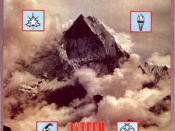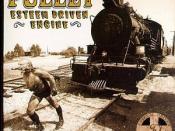Our primary investigation will focus on the question:ÃÂHow does external perception affect occupational rhetoric?ÃÂThis project will look at the way employeesÃÂ sensitivity to external perception influences how they portray themselves in different social environments. It has been found that in various occupations people will express their occupational affiliation and aspirations differently in diverse social settings. Furthermore, the study will investigate whether company status or other company variables such as the formal definition of their job play a role in occupational rhetoric.
In order to gain further insight and better understanding of the research agenda, the study will focus on the retail industry due to its large sample size and variability in sample types. The accessibility to respondents and casual nature of retail employment will provide favourable conditions for such a study.
Literature ReviewIt has been argued that employees develop a ÃÂself- imageÃÂ, or an identity regarding to their occupation. However, the way in which this identity is formed is contested.
For example, Fine argues that people draw on different occupational rhetorics, such as profession, art, business and labour to form their identity (Fine, 1996). Contrasting this, Alvesson and Willmott argue that identity is linked to managerial objectives (Alvesson and Willmott, 2002). Additionally, the situation and time in which an employee is asked about his or her profession also affects the portrayed self image (Fine, 1996). Faunce further argues that image is related to self esteem. His study finds that individuals are part of reference groups, and each group member evaluates themselves against others within the group. This leads to an ÃÂindividual status hierarchyÃÂ, which influences an individualÃÂs self esteem and the perception of the individual by others (Faunce, 1989).
Research MethodsInterviews of all ranks within retail shops will be conducted, as interviews will enable us to elicit information quickly. Additionally, it will allow us to see how individuals in the retail sector believe their identity is formed and how they convey their identity in different social settings. Questions would surround the issues:How do you think people view your job?How do you feel about it?When you talk to people about your job, what do you say?9 interviews will be conducted at 3 different retail settings, with 3 managers, 3 full time staff, and 3 casual staff interviewed.
Ethical Issues and CaveatsIssues may arise if people are unwilling to talk about their job because of confidentiality, or if they ÃÂplay upÃÂ their job to the interviewer as they would to any other external person asking about their job. We should reinforce the point previously stated by explaining the idea of a controlled environment and the difficulty in achieving genuine responses. Furthermore, the idea that truth cannot be measured effectively and therefore cannot certify 100% valid responses.
Perhaps another issue includes variables such as sex, race and religion. These variables may affect how employees define themselves and their work in different settings. Moreover, it might also be noted that the reverse exists. The employee might give differing responses dependant on the sex, race or religion of the person whom which they are talking to.
BibliographyAlvesson, M and Willmott, H, ÃÂIdentity Regulation as Organizational Control: Producing the Appropriate IndividualÃÂ, from Journal of Management Studies, Vol 39 Issue 5 (July 2002) p619- 645Faunce, William, ÃÂOccupational Status- Assignment Systems: The Effect of Status on Self EsteemÃÂ from AJS, Vol 95 No. 2 (September 1989): p378- 400Fine, Gary Alan, ÃÂJustifying work: Occupational Rhetorics as Resources in Restaurant KitchensÃÂ from Administrative Science Quarterly, Vol 41 Issue 1 (March 1996): p90- 106





